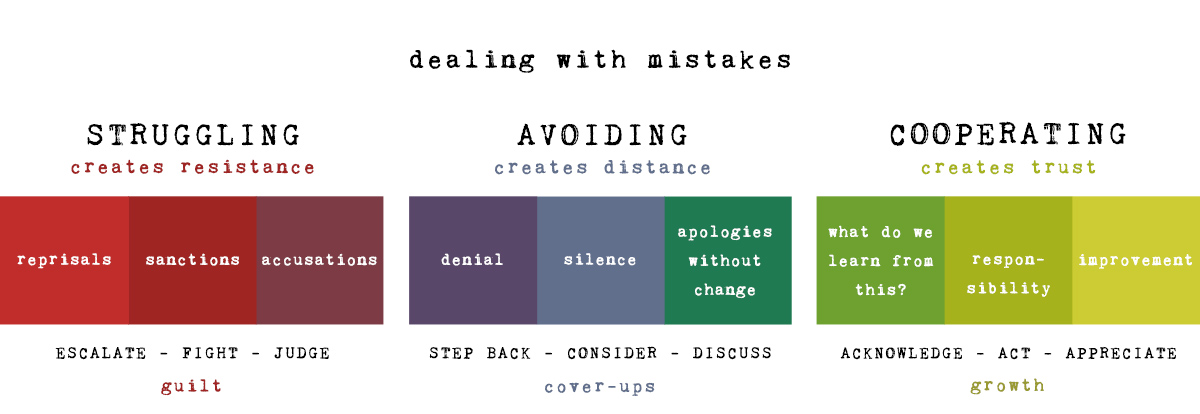Everyone makes mistakes…
How come no-one takes the blame when things go badly wrong? How come everyone looks for one person to blame when a mistake is made, whereas they know that everyone was involved and ‘could have done something’?
To understand this, we talk about three ‘worlds’ and also ‘worlds of difference’. The atmosphere in the group and the degree of trust largely determine whether team members feel they have room to admit mistakes – and whether the rest of the team can see mistakes as ways for THE WHOLE TEAM to learn. Only then does it become clear that many of them could have ‘done something’.
Mistakes in a survival situation
Making mistakes in a group that is under pressure, and where people are all struggling to survive, seldom produces learning results. Why is that? The answer is simple. In a survival situation, admitting a mistake meaning getting the blame, and ‘losing’ – losing your ego, your reputation or maybe even your job. Nobody wants that. Denial, and blaming someone else for the mistake, may then seem to produce more results in the short term, and for yourself: the pressure is shifted to someone else, and no extra time needs to be invested in change.
In teams or situations where people are fighting or in conflict with each other, they may also deliberately look for ways to blame someone else. This means they are less concerned with doing their own work properly, and more concerned with what others are doing (or not doing). This will have an impact on results (and the organization’s performance).
People who are subjected to more and more pressure become more and more defensive, and focus less and less on the actual situation. Even such a simple question as ‘Why did you do it that way?’ can create a lot of pressure. Compare it with ‘What could we do about it?’
Mistakes in an avoidance situation
No-one likes making mistakes, and no-one likes getting the blame. In a group where people are avoiding each other, no-one is blamed. The focus is not on punishment, or on learning from the situation. The mistake is covered up, tolerated, ignored or glossed over with an apology, and everyone carries on as before, with just as much pressure. People in an avoidance situation are often trying their best not to make mistakes. This means they do not take risks, and there is little personal or other development. Again, this will have an impact on results (and the organization’s performance).
Mistakes in a cooperation situation
If a group is close-knit, its members are given the appreciation they deserve and there is a crystal-clear shared goal, it becomes perfectly natural to make and admit mistakes. Saying ‘OK, sorry, I was wrong’ seldom leads to blame. Reporting a mistake is appreciated, because people can learn from it – and learning from mistakes brings them closer to the shared goal. The focus is then on finding out how the mistake could happen, and how the team can learn from it so that the same mistake isn’t made again. The result is that people feel safer, perform better and are more connected – a world of difference from a survival or avoidance situation. Even though mistakes are still made in cooperating groups, the learning results ensure that more and more things go well. A real growth process – and, once again, this will have an impact on results (and the organization’s performance).
Mistakes and politics
In situations with seemingly conflicting interests, and with various teams (parties) involved, it is all the more important to admit mistakes. Unfortunately there are plenty of cases in which this does not happen, such as the child allowances scandal which brought down the Dutch government in early 2021. The series of mistakes is clear, as are the reasons for them. Both houses of parliament, a succession of different governments, the courts and the media were all involved. But no-one took action or admitted making mistakes, and the resulting damage was immense. How can a growth process be restarted in such a situation? This will benefit ordinary citizens – and the focus will again be on a shared goal, the public interest. Only then can solutions and subsequent action be considered.
It is important to realize that as long as a serious mistake is denied and covered up, resistance will grow. The child allowances scandal was seized on by the media and members of parliament – and of course they looked for someone to blame. But does that leave room to learn from the mistakes that were made? And how much attention is then paid to finding a solution?
People can only deal with mistakes and learn from them by working together. A new president appeals for unity. He understands that cooperation is necessary in order to tackle a country’s problems. And he also knows that it takes time to face up to fear and anger, and turn them into energy for a new start. So is it necessary to blame and punish the outgoing president? When you are taking power, are anger and frustration an effective instrument?
To sum up
Every team in which mistakes can be admitted and people are able and willing to learn from them has the potential to be, or become, a top team.
